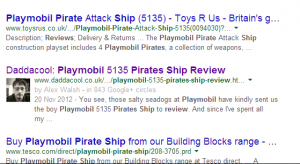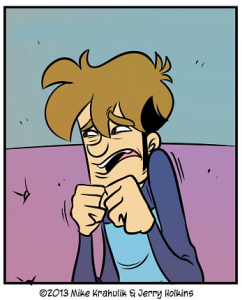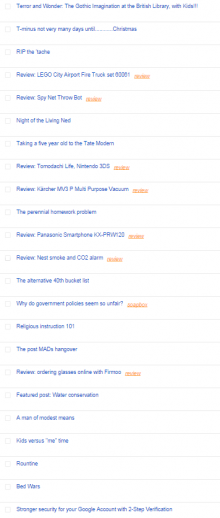- How do I get more subscribers/readers to my blog?
- Do I need to be on Pinterest?
- Should I have a separate FB page for my blog?
- Which blogging platform is right for me?
- What’s Google+ and should I use it?
- What’s SEO and why is it important to me?
- How do I leverage my personal brand across multiple platforms?
All of these are important questions that I see on Twitter, Facebook and Google+ regularly. In the interests of fairness, I am going to adopt two approaches to answering these questions. To explain this I’m going to first moan about Marshall McLuhan. McLuhan theorised that the manner in which information is transmitted is as important to the final consumption of the information (message in his terms) as the actual information itself. He explained it thus:
“He identified the light bulb as a clear demonstration of the concept of “the medium is the message”. A light bulb does not have content in the way that a newspaper has articles or a television has programs, yet it is a medium that has a social effect; that is, a light bulb enables people to create spaces during nighttime that would otherwise be enveloped by darkness. He describes the light bulb as a medium without any content. McLuhan states that “a light bulb creates an environment by its mere presence.”
The internet generally and social media specifically have had a radical impact on the way the message is carried and therefore thought about. Consider a blogging platform as something akin to McLuhan’s lightbulb- it allows information to be consumed in a radically different way to before and even goes as far as changing the information communicated.
However much I want to agree with McLuhan’s blurring of the distinction of the message and the manner of it’s transmission, I think that the difference between medium and message is an important distinction to bear in mind when it comes to asking questions about social media and blogging. It is a distinction that most who ask the question do not have, and it leads to confusion and frustration.
For example the seemingly straight forward question “How do I get more subscribers/readers to my blog?” is actually two distinct questions with two very different answers.
The first question, which is the one that the majority of people asking it are actually looking for is actually, “What tricks of SEO and website optimising can I employ to drive traffic to my blog?” This is a question about search engine optimisation and the answer to that lies in keywords, leading titles like the one for this post, page rank, authorship and a multitude of other technical issues. This is a question about the medium, not the actual the content of the blog.
The second distinct question, which from experience is not the question most people who ask the original question are thinking about is, “Is there anything I can do to the content of my blog to make more people read it?” This is a much harder question to answer honestly and can and will often be met with hostility. For some people, telling them to simply proof read or spell check each blog post before hitting publish is enough, for others something more radical may be needed. But fundamentally, if you write great content, people will read it. Yes, there is obviously slightly more to it than that and obviously some effort will be needed to make people aware of your great content in the first place but asking this second question at the beginning and sorting out the message before the medium is the most sensible way to drive content to your blog.
So with this in mind, these are my answers to the questions I posited at the start. There are two answers to each, the message answer is in blue, the medium answer is in black.
How do I get more subscribers/readers to my blog?
Write great content that’s true to yourself, relevant, spell checked and as good as you can make it. Consider reading up on grammar, looking at sites that list common writing mistakes or just asking other people who you respect for feedback. Don’t blog for the sake of it, blog when you want to, don’t follow the herd, avoid endless memes and linkies, do your own thing, with your own voice. Set the agenda by posting about what matters to you, not copying other people. Once you’ve done this, through practice, asking for constructive feedback or whatever, consider looking at some of the methods you can employ for getting a wider audience to appreciate your great writing.
People have many different reasons for blogging, some of which might include:
- Keeping an online journal of what they’ve done or opinions they have on subjects they care about;
- Being part of a community of like-minded people who they can share experiences with;
- Some form of self validation through metrics;
- Because they’ve seen other bloggers get free stuff and they want some free stuff too.
No particular reason is any more valid than any other but if you can pin down your motivation for blogging, offering advice on how to best achieve your goals is much easier. I could write an average blog post about something like my experiences with a Slendertone Abs belt, and get the blog post AND the YouTube video embedded in it on the front page of a Google search, bringing in 140,000 pageviews since I published it but that wouldn’t necessarily make me happy because for me blogging isn’t all about the stats. Yes, it’s easy for someone who has had 140,000 pageviews on one blog post to say that and perhaps if I was just starting out I’d feel miffed that such average content was getting so many hits.
A good, brief and informative title always helps. Make it relevant to your blog post, and put some detail in whilst keeping it short. For example, if I were to review a LEGO or Playmobil set, I would ensure that it had the set number in it. So if you call your post “Playmobil 5135 Pirates Ship Review” rather than “Playmobil Pirates Ship Review”, you’ll index better. I’m front page for that one too.
The most important factor in writing content that indexes well is to write content that is good AND indexes well, after all you’re writing for people, not bots or search engines in the end. Even big sites have some horrendous writing that is obviously done to cram the product name into the first paragraph several times at the cost of a natural flow to the words. You should aim for around 500 words for a blog post and try to keep key word mentions to around ten or slightly less.
Google Authorship is also a quick and easy way to make any search results that you have stand out in Google. It involves linking your Google+ profile to your blog, something that is easy to do with Blogger and not very difficult with WordPress. This puts a little profile picture of you next to your search results on Google:
This obviously stands out more, much like putting images in an Ebay listing. It’s possible to have more than one site linked to your G+ profile, and in turn the more articles you have authorship over that index well, the more weight is given to articles that have authorship attached to them. It’s like a virtuous circle.
You can of course get genuine traffic to your blog by taking part in memes, linkies, blog hops and other, more genuine community based activities. There is nothing wrong with this approach but I am of the opinion it robs you of some of the individuality that could make your blog different. I think I’ve taken part in about a dozen or so of these in my time- about 1% of the posts I’ve published and I stopped doing it a long time ago now, aside from the odd competition. My preferred method of interaction in this sense is conversation, you know, that thing you took to the internet to avoid in the first place. I’ll comment on blogs or discuss things with people over twitter any day of the week rather than posting a picture on a theme or whatever.
Do I need to be on Pinterest?
I’ve no idea. Do you? Like any platform, look at it, see what it does, and if what it does interests you, use it. I use Pintrest to share interesting images. If you read any of my blogs, you’ll notice I’m much more of a wordsmith than a photographer. yes, I put some pictures on my blog but for me Pintrest lets me share and collect all the funny pictures I find on the internet without having to resort to endless FB posts. it doesn’t complement my blog particularly but then I have a wide and varied set of interests, so it doesn’t have to. Honestly, you don’t need to have a social media strategy encompassing all the available platforms, just go and write some great content for your blog.
I know plenty of people who embed images from their blog into Pinterest, with the obvious backlink to their original post. This provides a potentially new audience to your blog as there isn’t a great deal of overlap between some platforms. If you’re more into visual things, putting a “Pin it” button on your blog might also encourage visitors to pin your stuff. I’ll put my hands up and say I’m not a user of Pinterest in this fashion but a quick trawl through Google shows some good tutorials. It really depends on what you want to achieve doesn’t it?
Should I have a separate FB page for my blog?
If you must. You’ll notice there isn’t a blue section for this because to me it all comes together as one reply- every single time FB updates its site or app, I find it increasingly hard to find anything posted by the people I actually want to see posts from. It’s baffling and I know I’m not the only one to think this. My short answer would be, “If you can maintain a separate page without distracting yourself from writing that great content I keep on mentioning, go for it.” Personally I can’t be bothered.
Which blogging platform is right for me?
The platform which lets you get on writing without having to search through help files, tutorials or anything else like that.
I’ve used Blogger, WordPress (hosted & self hosted), Tumblr, Joomla, Drupal, B2evo and recently have had a quick play with the new kid on the block, Ghost. My main blog is hosted on Blogger, this one is on a multi site self hosted installation of WordPress. Both have their advantages and disadvantages, Blogger makes it very easy to get started as you don’t even need a domain name, and with some faffing about you can install different themes- Daddacool.tv is hosted on Blogger, not that its immediately obvious. With Blogger you don’t have to have any behind the scenes tinkering and it’s unlikely you’ll lose everything by mistake.
Self hosting a WordPress site on the other hand can be a waking nightmare if a plugin stops working and causes some issue or is hijacked to inject malicious code into your site, a theme breaks, an update to WP itself sees you caught in a database update loop, if some hidden setting causes a memory issue that crashes even the admin login pages. I’m most definitely not a WordPress guru but I have run WordPress sites for over 5 years and used to hand code HTML sites back in the day. The time investment is keeping everything running smoothly is somewhat offset by the flexibility of what WordPress can do of course but if you’re just starting out, why not remain unencumbered by having to provide technical support for yourself until you’re sure you want to blog?
What’s Google+ and should I use it?
I use Google+ a little like a micro blog or online commentary and in my opinion this is the best way to use it. G+ facilitates linking really well; you can drop links or photos into a post and it will show a preview of a site or a thumb of the photo. I put a mixture of comment about news I’ve read, excerpts from my blog and photos I’ve found on G+. I also read and comment on other peoples posts because, you know, it’s SOCIAL. It gives me an outlet for any thoughts or musing that I don’t think fit on my blog or are maybe too short to warrant an actual blog post.
Google+ (G+) is nominally Google’s social network. They’ve had several attempts at this in the past (Buzz anyone?) but Google+ is going to be fairly integral to the future of Google’s operations. The biggest complaint I hear from people who have signed up to Google+ is that it’s a ghost town. Funny that, considering my Google+ profile has had over 2,000,000 views and In know Nickies had over 3,500,000 views on hers. Like anything to do with social media, the clue is in the name, SOCIAL media. If you want to have a busy timeline and get involved with people on G+, then have a conversation. The worst thing to do on G+ or any other platform is to simply link dump. Nobody will care. Trust me. Check out Nickies profile for her 4 parter on G+. I’ve not read it but if I know her, it’ll be pretty comprehensive.
Google+ is also a prerequisite for Google Authorship, so if you want the rinky dinky image of you to appear next to you in searches, you need a Google+ account and you need to link it to your blog. Think about it, Google is currently the king of search. They’re integrating their social network tightly into search. Would I rather be on G+ or Facebook in terms of maximising my exposure? I don’t think the answer going forwards will be rocket science from a search perspective.
What’s SEO and why is it important for me?
SEO stands for search engine optimisation and is designed to make your content index better in web searches. Before you throw yourself whole heartedly into it, first take a step back and consider why you actually blog in the first place. Is it to have total strangers pick up something you’ve written from a search engine and click on that one post, scan it, decide it’s not relevant and leave without reading anything else but giving you a valuable visit and pageview that will somehow validate you?
I’ve already covered some aspects of writing SEO optimised content above but if you want the real nitty gritty of SEO optimisation, have a read of the Tots 100 SEO blogcamp write up. Back in Feb 2013 I attended a course that was given by Distilled, the SEO agency, and hosted by the Tots 100 on this very matter. It was interesting and it’s well worth browsing Distilled resources for some useful pointers.
How do I leverage my personal brand across multiple platforms?
Really? You’re writing a damn blog, not planning word domination via a publishing empire. Calm it down a bit. Maybe you have a good domain name that’s catchy. That’s great. Concentrate on filling your blog with content that lives up to the name if that’s the case, otherwise stop being so pretentious.
The first port of call is to google your name and the name of your blog. Assuming that you have the same username across all of the social media platforms you’re using, this should give you an idea of what your social media footprint is like. You can then ascertain whether you’re giving a coherent message across all the platforms you’re using. Remember, using a few platforms well is better than using lots badly.
If you’re determined to proceed with this and want to spend half your blogging time mired in administration, there is plenty for you to think about:
- Find a site that analyses your twitter activity and that of your follows and schedule tweets for peak activity times to ensure they reach the widest audience possible.
- Draw up a “rota of sharing”. It’s not acceptable to share the same link to a blog post across four different social networks at the same time. Ever checked twitter, then hopped across to FB only to see exactly the same content shared at the top of your feed from people you follow? Annoying isn’t it? Consider whether some content is better suited to one medium and share as appropriate.
- Ensure your social media presence isn’t a megaphone- social media is about a two way conversation. If you’re only shouting out your content and not communicating with other people, you’ll see poor click through and even poorer engagement. You will in effect be wasting your time.
- Plenty of the content you write isn’t time restricted- something you wrote about last year may be relevant today- if it is share it as appropriate.
- If you’re going to share your posts on G+ or Facebook, try to caveat them with a comment about why people should read them, it shows you’re making an effort.
If you’ve made it this far, well done, that’s 3,000 odd words that have probably offended you at some point. If they have: GOOD. The worst thing about hearing everybody asking the same question is knowing full well that nearly no thought has gone into why those particular questions are being asked in the first place.
I’m not one for excessive naval gazing but it is important to have a real think about your motivations for blogging. I know successful bloggers who have become completely demoralised by obsessing over stats or relative success in one metric or the other. I’d suggest that they have forgotten about the reason they started blogging in the first place. Most importantly YOU’RE NOT IN A COMPETITION UNLESS YOU CHOOSE TO BE IN A COMPETITION. It doesn’t matter if someone else is getting cool stuff and you’re not, it doesn’t matter if someone else is getting more comments or pageviews or “respect” than you are.
You can read my top UK parenting blog Daddacool, find me on twitter or Google+. Say hello if you want to or leave a comment here instead. Thanks for reading.





